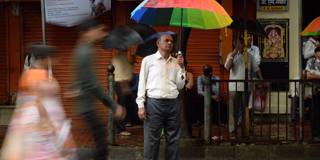In survey after survey, in rich and poor countries alike, people report feeling satisfied with their family lives, happy with the neighborhoods they live in, optimistic about their personal futures – and downright gloomy about their countries and the world. Why?
SANTIAGO – In Lake Wobegon, Garrison Keillor’s fictional American town, all the children are above average. And life imitates art, not only in America – and not only for the young. In survey after survey, in rich and poor countries alike, people report feeling satisfied with their family lives, happy with the neighborhoods they live in, and optimistic about their personal futures. The same people tell pollsters that their countries and the world are going to hell in a handbasket.

SANTIAGO – In Lake Wobegon, Garrison Keillor’s fictional American town, all the children are above average. And life imitates art, not only in America – and not only for the young. In survey after survey, in rich and poor countries alike, people report feeling satisfied with their family lives, happy with the neighborhoods they live in, and optimistic about their personal futures. The same people tell pollsters that their countries and the world are going to hell in a handbasket.